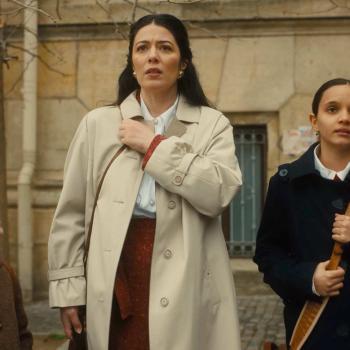Editors' Note: This article is part of the Patheos Public Square on Myth, Imagination, Fairy Tales, and Fantasy. And Faith. Read other perspectives here.
The imagery of myth and fairy tale, C. S. Lewis wrote, comprise "the words of a language which speaks the else unspeakable." For some, that language thrills and delights, and speaks of profound things which they crave to know. For others, it may be tolerable at best, despicable at worst — a language dangerous to listen to.
In fact, writers such as J. R. R. Tolkien and Ursula K. Le Guin saw fantasy as subversive to the ideals of the modern, post-industrial, commercialized world. (This idea might seem strange now, but the current mainstream popularity and financial success of fantasy and science fiction can act as "legitimizers" of these genres. Somebody who doesn't like fantasy might not bat an eye over your enthusiasm for Batman; they might think it stranger if you spend your evening reading Grimm's fairy tales or Gilgamesh.)
In her 1974 essay "Why Are Americans Afraid of Dragons?" (excellent title), Le Guin noted fantasy's implicit opposition to soul-deadening commercial materialism. In her words, "The kind of thing you learn from reading about the problems of a hobbit who is trying to drop a magic ring into an imaginary volcano has very little to do with your social status, or material success, or income."
Nobody in the wizarding world is impressed by Vernon and Petunia Dursley, no matter who they know or how much money they make. The Dursleys know this: hence their irrational animosity toward that world.
Fantasy, Le Guin suggests, defies materialism's monopolizing claim on our desires. Fantasy speaks the truth, "and that is precisely why many [adults] are afraid of fantasy. They know that its truth challenges, even threatens, all that is false, all that is phony, unnecessary, and trivial" in their lives.
According to G. K. Chesterton, one of the greatest virtues of imaginative fiction is its ability to reinvest the physical world — trees, rivers, air, grass, wind — with enchantment and mystery. Where positivism implies that knowing how something in nature functions (or what it's made of) effectively thwarts that sense of wonder, fantasy instead reminds us that the wonder is rightly felt. Fantasy, myth, and fairy tale thus threaten the modern claim that scientific materialism says all there is to say.
Tolkien also asserts fantasy's power to point us back toward awe of creation. Tolkien, though, wasn't only concerned with the way technology tended to demystify and disenchant nature; he was also concerned with the way scientific "progress" tended to outright destroy nature. His 1938 lecture "On Fairy-Stories" recounts horror at an Oxford colleague's cheerful declaration that the coming of more factories to the area would at last put them into "contact with real life." Yes, Tolkien responds with bitter sarcasm: "How real, how startlingly alive is a factory chimney compared with an elm tree: poor obsolete thing, insubstantial dream of an escapist!"
Tolkien notes that opponents of fantasy decry it as escapist, and suspect it of being reactionary — both good, says Tolkien. It is jailers who worry most about escape, he says; detractors of fantasy suppress opposition to the alleged inevitability of technological expansion. Like Le Guin, Tolkien sees fantasy as questioning certain values of modern society. In mythologizing nature and investing it with the supernatural, fantasy points toward "condemnation…of progressive things like factories, or the machine-guns and bombs that appear to be their most natural and inevitable, dare we say 'inexorable,' products."
Fantasy challenges many all-encompassing claims of the modern, industrialized, and secularized world; fantasy, according to Tolkien and Chesterton, also offers riches and beauties reaching beyond this world. Tolkien's short story "Leaf by Niggle," also written in 1938, depicts one "Councillor Tomkins" dismissing the title character's life-work, an elaborate, wall-sized painting of a tree, as "silly." Tomkins wonders why he couldn't have been a "serviceable cog" in society, perhaps painting advertisements instead. What Tomkins cannot see is that the painting literally contains a glimpse of Heaven itself, in the distant mountains and countryside seen through the tree's branches. This is the great power of imaginative fiction: as with Niggle's tree, hints of something greater come through.
"Every man has forgotten who he is," Chesterton writes. "We have all forgotten what we really are. All that we call common sense and rationality and practicality and positivism only means that for certain dead levels of our life we forget that we have forgotten. All that we call spirit and art and ecstasy only means that for one awful instant we remember that we forget."
While the modern world demands devotion to itself, myth and fairy tale cry out like a voice from another country, suggesting an alternate path — something richer and deeper. Many people surely perceive, at various points in their life, Tennyson's "horns of Elfland faintly blowing." What fantasy does is amplify and clarify that sound, until it becomes instead the "great horns of the North, wildly blowing" in Tolkien's Return of the King — the horns that dispel Death himself.
3/9/2016 5:00:00 AM




